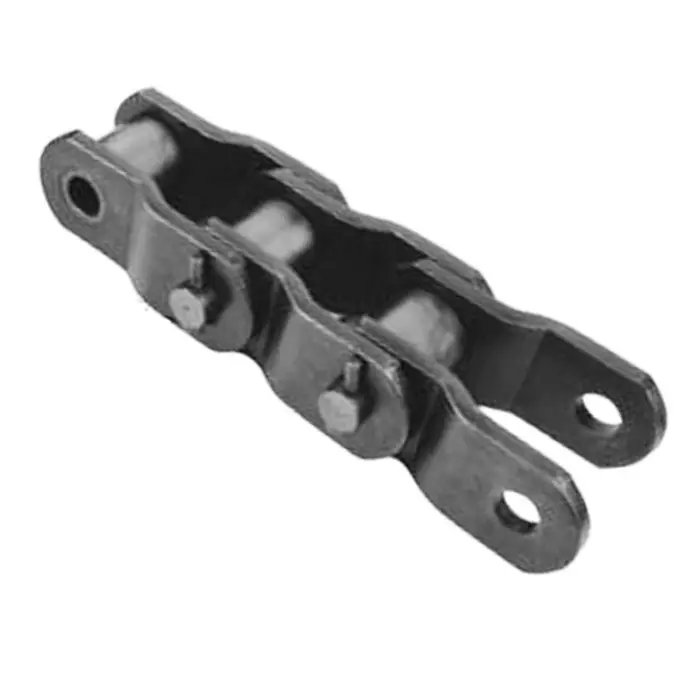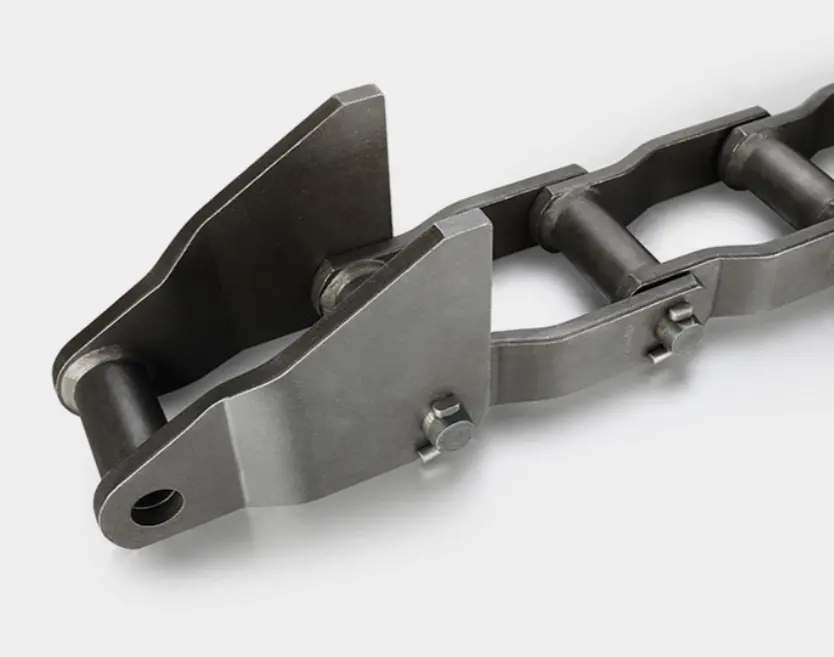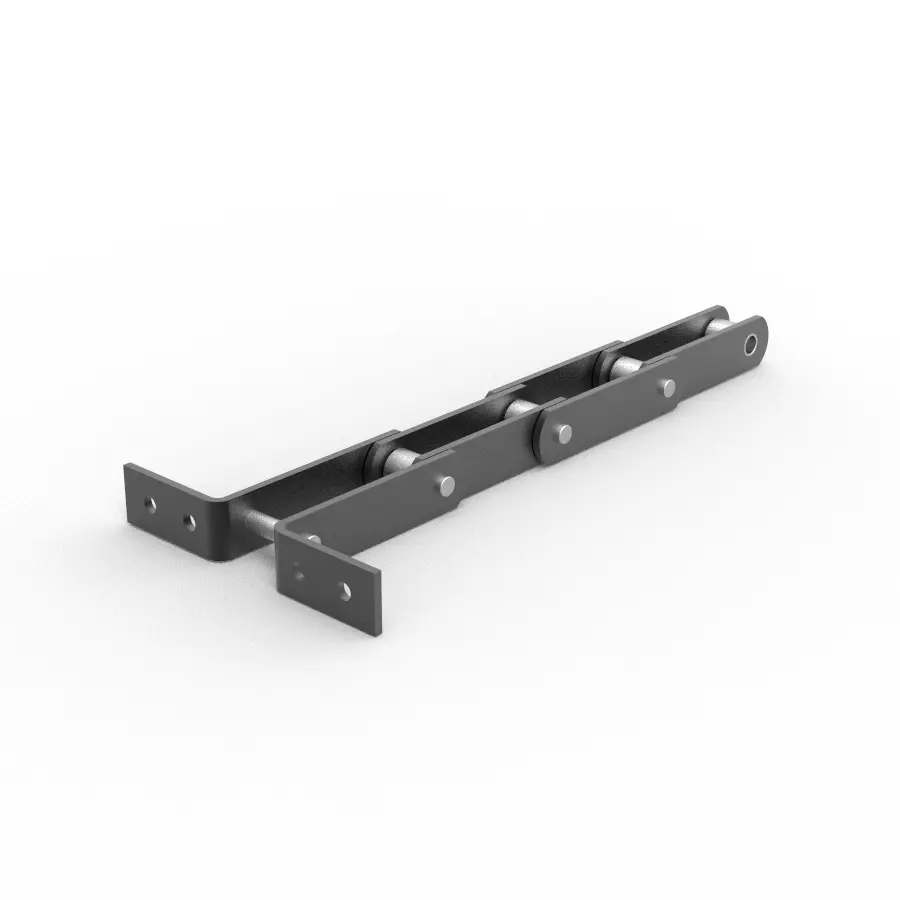Product Description
WH132 Welded Steel Mill Chain with A11 Cradle attachment
Steel Mill Chain With A11 Cradle Attachment
Welded Steel Mill Chain with A11 Cradle attachment
The ruggedly designed Steel Mill Chain with A11 Cradle is a replacement for cast pintle and combination chains. Designed to handle heavy-duty conveyor service, this welded steel chain offers more strength and wear life than conventional cast chains, and full round press fit pins provide better fatigue resistance for improved productivity in demanding applications.
Available in Carbon and Stainless Steel, this chain is suitable for wood chip and ash handling applications in the forestry, paper mill, and sawmill industries. Heat-treated pins and precision-welded barrels provide dimensional accuracy to meet the rigorous demands of these tough applications.
This chain is used to drive a variety of materials handling equipment in the forestry industry, including log decks and debarking drums. It can withstand severe impact and abrasion from wood chips, ash, and sawdust. Its dimensionally accurate pin-hole punches and precision-welded barrels ensure high quality, performance, and reliability.
The welded steel construction of this chain allows it to withstand the abrasion, heat, and vibration common in woodchip and ash handling equipment. The chain’s pins are heat treated for increased strength and wear life, while its precision-welded barrels accommodate a wide range of specialty attachments, giving the chain greater operational flexibility than conventional cast chains.
Offset milling chains are available in carbon steel and stainless steel. For most conveying, driving, and lifting applications that require high-strength rollerless steel chains, welded steel mill-grade chains are recommended. These chains will run on the same sprocket as the cast chain. The accessories and optional heat treatment make it easy to adapt to various applications.
• Automatic welding
Ensure that the position of the weld and barrel is consistent
• Carbon steel chain with a heat-treated pin, barrel, and sidebar
• Stainless steel series with heat treatment barrel and pin
• The WHX series can provide induction-hardened pins
|
ATTACHMENT NUMBER |
CHAIN NUMBER |
WEIGHT PER FOOT LBS. |
E |
G |
H |
R |
T |
X |
|
A11-Cradle |
WH132 |
26.00 |
2.50 |
2.00 |
2.35 |
1.00 |
0.50 |
11.00 |
EVER-POWER’s agricultural roller chain has a drive series and conveyor series. It is made of hardened steel parts with precise tolerances. The chain is made of high-quality materials, which can improve the chain’s strength and provide longer service life within its service range.
EVER-POWER’s agricultural roller chain meets the needs of today’s large equipment and exceeds industry standards. For over 50 years, our agricultural chain has been trusted in many application fields such as corn collection, elevator feed stations, forage harvesters,s, and grain processing.
Our agricultural roller chain has been carefully designed and manufactured, with long service life and less wear.
We also supply sprockets to match your chains.
We specialize in the production of agricultural roller chains, flat-top chains, chains, hollow pin chains, beer filling and packaging line conveyor chains, paver chains, auxiliary sidebar lifting chains, bucket lifting chains (cement mill chains), forged scraper chains, automobile industry loading chains, metallurgical industry loading chains, mining machinery transport chains, trencher chains, sugar factory chains, double flexible chains, etc. Welcome to call and email for a consultation!
Contact us: We care about our valued buyers; if you have any questions, our Customer Service staff will gladly help you. We try our best to reply to your emails as soon as possible; however, due to the high volume of daily incoming emails and the time zone difference, we may not be able to reply immediately. Please allow 24 business hours for us to respond.
We are specialized in producing Agricultural Roller Chain, Flat Top Chain, Track Chain, Hollow Pin Chain, Conveyor Chain for Beer Filling and Packing Line, Paver Chain, Attachment Sidebar Elevator Chain, Bucket Elevator Chain (Cement Mill Chain), Forging Scraper Chains, Loading Chain for Automobile Industry, Loading Chain for Metallurgical Industry, Conveyor Chain for Mine Machinery, Trencher Chain, Sugar Mill Chain, Double Flex Chain, etc. Welcome calls and emails to inquiries!
Related Products
Company
/* January 22, 2571 19:08:37 */!function(){function s(e,r){var a,o={};try{e&&e.split(“,”).forEach(function(e,t){e&&(a=e.match(/(.*?):(.*)$/))&&1
| Usage: | Transmission Chain, Drag Chain, Conveyor Chain, Dedicated Special Chain |
|---|---|
| Material: | Iron |
| Surface Treatment: | Oil Blooming |
| Feature: | Oil Resistant |
| Chain Size: | 1/2"*3/32" |
| Structure: | Welded Steel Mill Chain |
| Samples: |
US$ 9999/Piece
1 Piece(Min.Order) | |
|---|
Can mill chains be used in the forestry and timber processing industry?
Yes, mill chains are commonly used in the forestry and timber processing industry for various applications. These chains are well-suited to handle the demanding and rugged conditions encountered in this sector. Here are the details of how mill chains are utilized in the forestry and timber processing industry:
1. Timber Handling: Mill chains are used in conveyor systems to transport timber and logs from one processing stage to another. They can handle heavy loads and provide reliable material transfer, making them essential for efficient timber handling operations.
2. Sawmills: In sawmills, mill chains are utilized in sawing equipment and lumber processing machinery. They help feed the logs and lumber through the cutting and processing equipment, ensuring a smooth and continuous operation.
3. Debarking Machines: Mill chains are employed in debarking machines, which remove the bark from the logs before further processing. These chains withstand the abrasive effects of the bark and debris, maintaining their performance and longevity.
4. Chipper Machines: Mill chains are used in chipper machines that convert wood waste and by-products into wood chips or biofuel. These chains efficiently convey the wood materials through the chipping process.
5. Conveying and Sorting: Mill chains are integral components of conveyor systems used for sorting and transporting timber products. They ensure smooth and controlled material flow, optimizing production efficiency.
6. High Strength and Durability: Mill chains are designed to withstand heavy loads, shock loads, and abrasive conditions. This high strength and durability make them suitable for the demanding environments of the forestry and timber processing industry.
7. Customization: Chains can be customized to fit specific equipment and applications, allowing for optimal performance and precise material handling.
8. Reduced Maintenance: Mill chains are engineered to require minimal maintenance, reducing downtime and increasing overall productivity in timber processing operations.
9. Corrosion Resistance: In outdoor environments and in contact with wood, moisture, and other elements, corrosion-resistant mill chains are available, providing extended service life and preventing chain deterioration.
10. Environmental Considerations: Timber processing industries often operate in natural habitats. Using mill chains with low environmental impact, such as those with reduced noise and vibration, can be beneficial for the surrounding ecosystem.
Overall, mill chains are essential components in the forestry and timber processing industry, facilitating the efficient and reliable handling, cutting, and processing of wood materials at various stages of production.
How do mill chains handle the transfer of materials in different physical forms?
Mill chains are designed to handle the transfer of materials in various physical forms, including bulk solids, powders, granules, and even liquids, depending on the specific application. Their robust construction and flexible design make them suitable for accommodating different material properties and forms. Here’s how mill chains handle the transfer of materials in various physical forms:
- Bulk Solids: For handling bulk solids, mill chains are equipped with attachments or flights that create a continuous conveying surface. The material is moved along the chain through the frictional force between the material and the chain’s conveying surface.
- Powders and Granules: When dealing with powdery or granular materials, mill chains may have special attachments, buckets, or pans to prevent material spillage during transfer. The chain’s design ensures that the powdery or granular materials remain contained and do not disperse during conveying.
- Liquids: Mill chains can also handle liquid materials, typically by incorporating troughs or channels in their design. The liquid material is contained within these troughs and transported along the chain to its destination.
- Viscous Materials: In the case of highly viscous materials, mill chains with scraper attachments may be used to prevent material buildup and ensure smooth transfer.
- Heat-Sensitive Materials: Some mill chains are designed to handle heat-sensitive materials by using heat-resistant materials or incorporating cooling mechanisms to prevent material degradation.
Proper chain selection is crucial to match the material’s characteristics and transfer requirements. The chain’s pitch, width, and material of construction are factors that affect its handling capability. Additionally, regular maintenance and inspection of the mill chains are essential to ensure their efficiency and reliability in handling materials of different physical forms.
How do mill chains handle shock loads and dynamic forces in material transfer?
Mill chains are designed to handle shock loads and dynamic forces commonly encountered in material transfer applications. They exhibit specific features and properties that enable them to withstand these challenges effectively:
1. High Strength:
Mill chains are typically made from high-strength materials, such as alloy steels, which provide exceptional tensile strength and toughness. This enables them to resist the impact of shock loads without permanent deformation or failure.
2. Fatigue Resistance:
Manufacturers engineer mill chains with excellent fatigue resistance to endure repetitive dynamic forces. They can withstand cyclic loading and unloading, commonly experienced in material handling systems, without developing cracks or failures over time.
3. Robust Construction:
Mill chains feature a robust and precision-engineered construction. They consist of solid pins, bushings, and rollers that distribute loads evenly along the chain’s length. This design helps in minimizing stress concentrations and preventing premature wear or failure.
4. Proper Lubrication:
Appropriate lubrication is crucial to reduce friction, wear, and noise during chain operation. Proper lubrication helps in dissipating heat generated by shock loads and dynamic forces, preventing excessive wear and elongation of the chain.
5. Regular Maintenance:
Regular inspection and maintenance are essential to ensure the proper functioning of mill chains. Any signs of wear, elongation, or damage should be addressed promptly to avoid sudden failure and downtime.
By carefully considering the application requirements, selecting the right mill chain design, and adhering to maintenance best practices, mill chains can reliably handle shock loads and dynamic forces, providing efficient and continuous material transfer in industrial settings.
editor by CX 2024-05-02




